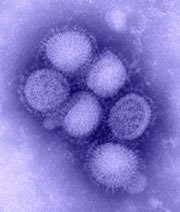Influenza (FLU)

Action Steps to Prevent and Manage Flu
Seek immediate medical evaluation for any of the following symptoms: Difficulty breathing or shortness of breath, pain or pressure in the chest or abdomen, sudden dizziness, confusion, and severe or persistent vomiting. Other warning signs that are of concern: flu-like symptoms improve but then return with fever and worse cough, fever with a rash, or signs and symptoms of dehydration when not getting enough fluids (dry mouth, thirsty, urinating infrequently and in small, concentrated amounts, nausea, lightheadedness).
- Practice good hand hygiene [YouTubeVideo: CDC] by washing your hands often (for 20 seconds) with soap and water, especially after coughing or sneezing. Alcohol-based hand sanitizers with about 60% alcohol are also effective.
- Cover your mouth and nose with a tissue when you cough or sneeze. If you don’t have a tissue, cough or sneeze into your inner elbow or shoulder, not into your hands. Avoid touching your mouth, nose, or eyes after touching commonly used areas until you have washed your hands. Avoid sharing computer keyboards and wash hands after using a shared computer.
- Stay home or at your place of residence if you are sick, for at least 24 hours after you no longer have a fever (100 degrees Fahrenheit or 38 degrees Celsius) or signs of a fever (have chills, feel very warm, have a flushed appearance, or are sweating). This should be determined without the use of fever-reducing medications (any medicine that contains ibuprofen or acetaminophen). Staying away from others while sick can prevent others from getting sick too. Ask a roommate, friend, or family member to check up on you and to bring you food and supplies if needed.
- Students should call the health center for symptoms of flu-like illness: fever and/or fever-like symptoms of chills/sweats/flushed skin and cough, sore throat, body aches, fatigue, and possibly diarrhea and vomiting.
- Student may wish to go home to recover if they live nearby. Avoid flying or public transportation if you have flu-like illness. Notify your professors, dean, and the SHWC if you have the flu and are going to recover at home.
Vaccination
The American College Health Association (ACHA) strongly recommends that all college students get the flu vaccine every year. This helps to protect not only the individual student, but also the wider college community against the spread of flu.
The cost to student for vaccination is $25.00, which can be charged directly to the student account. Students can also print a receipt and submit the charge to their individual insurance company for possible reimbursement.
The student health center will continue to partner with Rite Aid Pharmacy to provide students the influenza vaccine. The vaccine clinics typically take place in September and October.
If you have any questions regarding vaccine information or financial hardship please feel free to contact the health center at health@swarthmore.edu.
Visit: www.flu.gov


